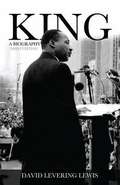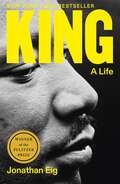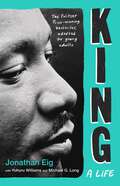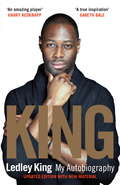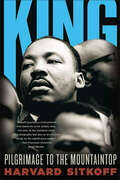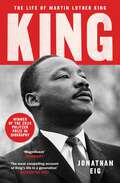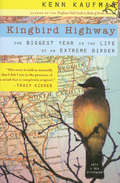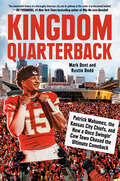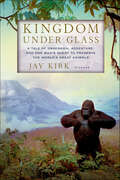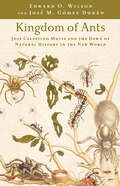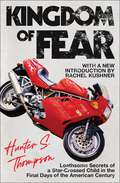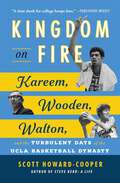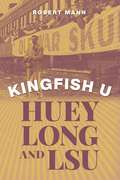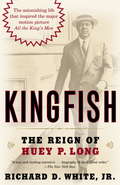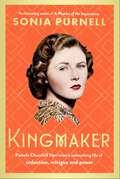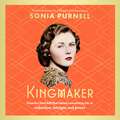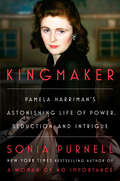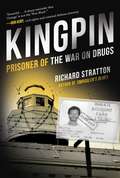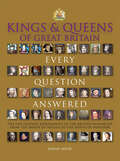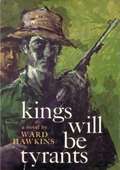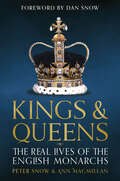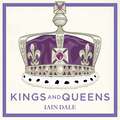- Table View
- List View
King: A Biography
by David Levering LewisAcclaimed by leading historians and critics when it appeared shortly after the death of Dr. Martin Luther King Jr., this foundational biography wends through the corridors in which King held court, posing the right questions and providing a keen measure of the man whose career and mission enthrall scholars and general readers to this day. Updated with a new preface and more than a dozen photographs of King and his contemporaries, this edition presents the unforgettable story of King's life and death for a new generation.
King: A Life
by Jonathan EigWINNER OF THE 2024 PULITZER PRIZE FOR BIOGRAPHYA finalist for the 2023 National Book Critics Circle Award | Named one of the ten best books of 2023 by The Washington Post, Chicago Tribune, and TimeA New York Times bestseller and notable book of 2023 | One of Barack Obama’s favorite books of 2023One of The New Yorker’s essential reads of 2023 | A Christian Science Monitor best book of the year | One of Air Mail’s twelve best books of 2023A Washington Post and national indie bestseller | One of Publishers Weekly’s best nonfiction books of 2023 | One of Smithsonian magazine’s ten best books of 2023“Supple, penetrating, heartstring-pulling and compulsively readable . . . Eig’s book is worthy of its subject.” —Dwight Garner, The New York Times (Editors’ Choice)“[King is] infused with the narrative energy of a thriller . . . The most compelling account of King’s life in a generation.” —Mark Whitaker, The Washington Post“No book could be more timely than Jonathan Eig’s sweeping and majestic new King . . . Eig has created 2023′s most vital tome.” —Will Bunch, The Philadelphia InquirerHailed by The New York Times as “the new definitive biography,” King mixes revelatory new research with accessible storytelling to offer an MLK for our times.Vividly written and exhaustively researched, Jonathan Eig’s King: A Life is the first major biography in decades of the civil rights icon Martin Luther King Jr.—and the first to include recently declassified FBI files. In this revelatory new portrait of the preacher and activist who shook the world, the bestselling biographer gives us an intimate view of the courageous and often emotionally troubled human being who demanded peaceful protest for his movement but was rarely at peace with himself. He casts fresh light on the King family’s origins as well as MLK’s complex relationships with his wife, father, and fellow activists. King reveals a minister wrestling with his own human frailties and dark moods, a citizen hunted by his own government, and a man determined to fight for justice even if it proved to be a fight to the death. As he follows MLK from the classroom to the pulpit to the streets of Birmingham, Selma, and Memphis, Eig dramatically re-creates the journey of a man who recast American race relations and became our only modern-day founding father—as well as the nation’s most mourned martyr.In this landmark biography, Eig gives us an MLK for our times: a deep thinker, a brilliant strategist, and a committed radical who led one of history’s greatest movements, and whose demands for racial and economic justice remain as urgent today as they were in his lifetime.Includes 8 pages of black-and-white photographs
King: A Life (Young Adult Edition)
by Jonathan EigHailed as “the most compelling account of [Martin Luther] King’s life in a generation” by the Washington Post, the Pulitzer Prize–winning bestseller is now adapted for young adults in this new standard biography of the most famous civil rights activist in American History. Often regarded as more of a myth and legend than man, the Reverend Dr. Martin Luther King Jr. was many things throughout his storied life: student, activist, preacher, dreamer, father, husband. From his Atlanta childhood centered in the historically Black neighborhood of Sweet Auburn to his precipitous rise as a civil rights leader on the streets of Birmingham, Selma, and Montgomery, Dr. King would go on to become one of the most recognizable, influential, and controversial persons of the twentieth century.In this fast-paced and immersive adaptation of Jonathan Eig’s groundbreaking New York Times bestseller readers will meet a Dr. King like no other: a committed radical whose demands for racial and economic justice remain as urgent today as they were in his lifetime, a minister wrestling with his human frailties and dark moods, a citizen hunted by his own government.The inspiring young adult edition of King: A Life highlights the author’s never-before-seen research—including recently declassified FBI documents—while reaffirming and recontextualizing the lasting effects and implications of MLK’s work for the present day. Adapted by National Book Award–nominated authors Yohuru Williams and Michael G. Long, this biography for a new generation is a nuanced, unprecedented portrayal of a man who truly shook the world.Accolades and Praise for King: A Life: Pulitzer Prize WinnerA New York Times, Washington Post, and Indie BestsellerA National Book Award Nominee One of Barack Obama’s Favorite Books of the Year A National Book Critics Circle Award Finalist A “Best Book of the Year” from New York Times ● Washington Post ● TIME Magazine ● The New Yorker ● Publishers Weekly ● The Chicago Tribune ● Smithsonian Magazine ● Christian Science Monitor ● Air Mail“Supple, penetrating, heartstring-pulling and compulsively readable . . . Eig’s book is worthy of its subject.” —New York Times “No book could be more timely than Jonathan Eig’s sweeping and majestic new King.” —Philadelphia Inquirer
King: Ledley King: My Autobiography
by Ledley KingBorn in Bow in 1980, Ledley King joined Tottenham Hotspur as a trainee at the age of sixteen, and was a White Hart Lane talisman from his 1999 debut through to his retirement in 2012. Telling it how it was behind the scenes at Spurs during his years progressing from schoolboy trainee to club captain, King dramatically chronicles the turbulent times and personalities of the modern White Hart Lane. Yet above all, King is the story of one of the most widely admired and respected English footballers of modern times - one of passion and roots, friendship, courage, grit; and of a role model of great strength yet rare humility.
King: My Autobiography
by Ledley King Mat SnowBorn in Bow in 1980, Ledley King joined Tottenham Hotspur as a trainee at the age of sixteen, and was a White Hart Lane talisman from his 1999 debut through to his retirement in 2012. Telling it how it was behind the scenes at Spurs during his years progressing from schoolboy trainee to club captain, King dramatically chronicles the turbulent times and personalities of the modern White Hart Lane. Yet above all, King is the story of one of the most widely admired and respected English footballers of modern times - one of passion and roots, friendship, courage, grit; and of a role model of great strength yet rare humility.
King: Pilgrimage to the Mountaintop
by Harvard SitkoffIn this fast-paced, concise biography, Harvard Sitkoff presents a stunningly relevant and radical Martin Luther King, Jr. whose greatest accomplishments may have been yet to come. King's murder in April 1968 did far more than cut tragically short the life of one of America's most remarkable civil rights leaders. In commemorating King's achievements at the end of his life and ignoring his defeats, too many Americans quickly relegated the civil rights struggle to the past, halting the progression of the activist’s evolving movement.King: Pilgrimage to the Mountaintop honestly assesses his successes along with his failures—as an organizer in Albany, Georgia and St. Augustine, Florida; as a leader of ever more strident activists; and as a husband. Harvard Sitkoff weaves both high and low points together to capture King's lifelong struggle, through disappointment and epiphany, with his own injunction: "Let us be Christian in all our actions." By telling King's life as one on the verge of reaching its fullest fulfillment, Sitkoff powerfully shows where King's faith and activism were leading him—to a direct confrontation with a president over an immoral war and with an America blind to its complicity in economic injustice.
King: The Life of Martin Luther King
by Jonathan EigThe compelling story of Martin Luther King's life and achievements has become simplified and domesticated in a way that fails to do full justice to his radical vision and importance. Now, in King, we get the most comprehensive and complete portrait ever written about this iconic figure. The first major new biography of Martin Luther King Jr in over 40 years, Jonathan Eig's superb King is based on years of research, hundreds of interviews with those who knew him and many thousands of previously unreleased documents, including a huge cache from the FBI. Eig reveals King's story to be more compelling and more complex than we knew. For too long, his radical vision for the future has been erased. The hope of his 'I have a dream' message and the tragedy of his assassination at the age of 39 have overwhelmed the story of a brilliantly bold and complicated man, which obscures his real significance of today's society and for the future. His vision went far beyond achieving equal treatment for black men and women, which was only a part of a much greater and more wide-ranging mission - something that has been forgotten by most. Eig's fascinating biography not only shines new light on King's remarkable career, but also humanises him so that he becomes more than a symbol of hope and defiance, but a man with flaws, a sense of humour, as a father and a husband. It's an essential read for our times.
Kingbird Highway: The Biggest Year in the Life of an Extreme Birder
by Kenn KaufmanAn ornithologist&’s account of his youthful, year-long, cross-country birdwatching adventure: &“A fascinating memoir of an obsession.&” —Booklist At sixteen, Kenn Kaufman dropped out of the high school where he was student council president and hit the road, hitching back and forth across America, from Alaska to Florida, Maine to Mexico. Maybe not all that unusual a thing to do in the seventies, but what Kenn was searching for was a little different: not sex, drugs, God, or even self, but birds. A report of a rare bird would send him hitching nonstop from Pacific to Atlantic and back again. When he was broke he would pick fruit or do odd jobs to earn the fifty dollars or so that would last him for weeks. His goal was to set a record—most North American species seen in a year—but along the way he began to realize that at this breakneck pace he was only looking, not seeing. What had been a game became a quest for a deeper understanding of the natural world. Kingbird Highway is a unique coming-of-age story, combining a lyrical celebration of nature with wild, and sometimes dangerous, adventures, starring a colorful cast of characters.
Kingdom Quarterback: Patrick Mahomes, the Kansas City Chiefs, and How a Once Swingin' Cow Town Chased the Ultimate Comeback
by Mark Dent Rustin DoddFresh off of a gutsy, thrilling 2023 Super Bowl win for the Kansas City Chiefs, two inspiring stories that fit perfectly together—a biography of superstar quarterback, Patrick Mahomes, who brought the Chiefs to their first Super Bowl win in fifty years in 2020 as well as a second in 2023, along with the historical struggles and recent resurgence of the former &“Paris of the Plains,&” Kansas City. There is nobody like Patrick Mahomes. In three seasons, he has won a Super Bowl and competed in another, earned the titles of First Team All-Pro, NFL Offensive Player of the Year, and league MVP, and turned the Kansas City Chiefs from famed playoff failures into the most successful team in the NFL. With his unique and groundbreaking playing style, and winning personality both on and off the field, Mahomes has become a truly transcendent quarterback in a journey that mirrors and accentuates the rebirth of the once swingin&’ cow town of Kansas City, Missouri. Once an adventure-filled jazz epicenter and nightlife hub to rival New Orleans, Kansas City&’s wild edges and captivating neighborhoods were snuffed out in pursuit of a suburbanized dream that largely left out people of color. It&’s been a long road attempting to move past the scars of segregation and overcome the city&’s flyover reputation, but Kansas City is now poised to make a comeback, and no other person or team embodies that hope like Patrick Mahomes and the Kansas City Chiefs. Kansas City and Mahomes represent the story of the midwestern American city—how they grew, how they shaped the country, how the sport of football came to mean so much to them, how they failed, and how they are changing. Kansas City–area natives Mark Dent and Rustin Dodd have written for outlets such as The New York Times, The Kansas City Star, and Texas Monthly, bringing their deep connection to the city, football expertise, and polished writing skills to create a serious book about a very entertaining subject—the rebirth of a city, a team&’s triumph, and how Patrick Mahomes, and the team he led, were exactly what was needed to bring Kansas City back together again.
Kingdom Under Glass: A Tale of Obsession, Adventure, and One Man's Quest to Preserve the World's Great Animals
by Jay KirkA sweeping historical narrative of the life of Carl Akeley, the famed explorer and taxidermist who changed the way Americans viewed the conservation of the natural worldDuring the golden age of safaris in the early twentieth century, one man set out to preserve Africa's great beasts. In this epic account of an extraordinary life lived during remarkable times, Jay Kirk follows the adventures of the brooding genius who revolutionized taxidermy and created the famed African Hall we visit today at New York's Museum of Natural History. The Gilded Age was drawing to a close, and with it came the realization that men may have hunted certain species into oblivion. Renowned taxidermist Carl Akeley joined the hunters rushing to Africa, where he risked death time and again as he stalked animals for his dioramas and hobnobbed with outsized personalities of the era such as Theodore Roosevelt and P. T. Barnum. In a tale of art, science, courage, and romance, Jay Kirk resurrects a legend and illuminates a fateful turning point when Americans had to decide whether to save nature, to destroy it, or to just stare at it under glass.
Kingdom of Ants: José Celestino Mutis and the Dawn of Natural History in the New World
by Edward O. Wilson José M. DuránOne of the earliest New World naturalists, José Celestino Mutis began his professional life as a physician in Spain and ended it as a scientist and natural philosopher in modern-day Colombia. Drawing on new translations of Mutis's nearly forgotten writings, this fascinating story of scientific adventure in eighteenth-century South America retrieves Mutis's contributions from obscurity.In 1760, the 28-year-old Mutis—newly appointed as the personal physician of the Viceroy of the New Kingdom of Granada—embarked on a 48-year exploration of the natural world of northern South America. His thirst for knowledge led Mutis to study the region's flora, become a professor of mathematics, construct the first astronomical observatory in the Western Hemisphere, and amass one of the largest scientific libraries in the world. He translated Newton's writings and penned essays about Copernicus; lectured extensively on astronomy, geography, and meteorology; and eventually became a priest. But, as two-time Pulitzer Prize–winner Edward O. Wilson and Spanish natural history scholar José M. Gómez Durán reveal in this enjoyable and illustrative account, one of Mutis's most magnificent accomplishments involved ants. Acting at the urging of Carl Linnaeus—the father of taxonomy—shortly after he arrived in the New Kingdom of Granada, Mutis began studying the ants that swarmed everywhere. Though he lacked any entomological training, Mutis built his own classification for the species he found and named at a time when New World entomology was largely nonexistent. His unorthodox catalog of army ants, leafcutters, and other six-legged creatures found along the banks of the Magdalena provided a starting point for future study.Wilson and Durán weave a compelling, fast-paced story of ants on the march and the eighteenth-century scientist who followed them. A unique glance into the early world of science exploration, Kingdom of Ants is a delight to read and filled with intriguing information.
Kingdom of Fear: Loathsome Secrets of a Star-Crossed Child in the F
by Hunter S. ThompsonThe Gonzo memoir from one of the most influential voices in American literature, Kingdom of Fear traces the course of Hunter S. Thompson’s life as a rebel—from a smart-mouthed Kentucky kid flaunting all authority to a convention-defying journalist who came to personify a wild fusion of fact, fiction, and mind-altering substances.Brilliant, provocative, outrageous, and brazen, Hunter S. Thompson's infamous rule breaking—in his journalism, in his life, and under the law—changed the shape of American letters, and the face of American icons. Call it the evolution of an outlaw. Here are the formative experiences that comprise Thompson’s legendary trajectory alongside the weird and the ugly. Whether detailing his exploits as a foreign correspondent in Rio, his job as night manager of the notorious O’Farrell Theatre in San Francisco, his epic run for sheriff of Aspen on the Freak Power ticket, or the sensational legal maneuvering that led to his full acquittal in the famous 99 Days trial, Thompson is at the peak of his narrative powers in Kingdom of Fear. And this boisterous, blistering ride illuminates as never before the professional and ideological risk taking of a literary genius and transgressive icon.
Kingdom on Fire: Kareem, Wooden, Walton, and the Turbulent Days of the UCLA Basketball Dynasty
by Scott Howard-CooperIn the tradition of Blood in the Garden and Three-Ring Circus comes a bold narrative history of the iconic UCLA Bruins championship teams led by legendary coach John Wooden—an incredible true story about the messy, never-easy pursuit of perfection set against the turmoil of American culture in the 1960s and 70s. Few basketball dynasties have reigned supreme like the UCLA Bruins did over college basketball from 1965–1975 (seven consecutive titles, three perfect records, an eighty-eight-game winning streak that remains unmatched). At the center of this legendary franchise were the now-iconic players Kareem Abdul Jabbar and Bill Walton, naturally reserved personalities who became outspoken giants when it came to race and the Vietnam War. These generational talents were led by John Wooden, a conservative counterweight to his star players whose leadership skills would transcend the game after his retirement. But before the three of them became history, they would have to make it—together. Los Angeles native and longtime sportswriter for the Los Angeles Times, Scott Howard Cooper draws on more than a hundred interviews and extensive access to many of the principal figures, including Wooden&’s family to deliver a rich narrative that reveals the turmoil at the heart of this storied college basketball program. Making the eye-opening connections between UCLA and the Nixon administration, Ronald Reagan, Muhammad Ali, and others, Kingdom on Fire puts the UCLA basketball team&’s political involvement and influence in full relief for the first time. The story of UCLA basketball is an incredible slice of American history that reveals what it truly takes to achieve and sustain greatness while standing up for what you believe in.
Kingdoms of Experience: Everest, the Unclimbed Ridge
by Andrew GreigA novice&’s tale of scaling Everest: &“Recommended for all armchair adventurers who have ever wondered what it would be like to climb in the Himalayas.&”—Geographical Magazine The last attempt to conquer Everest by the unclimbed northeast ridge had ended in failure and tragedy, with the deaths of two great climbers, Joe Tasker and Pete Boardman. Now, in March 1985, Mal Duff would lead a new expedition. Andrew Grieg and the others knew the risks as well as the excitement of the challenge—and in this extraordinary book, Greig chronicles not only the assault on the peak but also the complex relationships of nineteen very different personalities living together. &“Poet, novelist, and novice climber Greig's insightful account of the 1985 ascent of Everest's previously unclimbed northeast ridge provides an unusual perspective on the world of climbing. In comparison to many seasoned mountaineers, with their sometimes obsessive &‘diehard&’ drive, Greig possesses a refreshing sense of enthusiasm and innocence. His lack of experience allows him to describe with great intensity and detail the difficult tasks of climbing in a methodical step-by-step fashion, allowing readers to grasp the complex challenges. Greig is often able to step back and observe the goings-on, providing a detached analysis of the group and its dynamics. To complement his version of events, he also draws liberally from the diaries of the other participants. A unique addition to mountaineering literature with charming and distinct characteristics.&”—Library Journal
Kingfish U: Huey Long and LSU
by Robert MannNo political leader is more closely identified with Louisiana State University than the flamboyant governor and U.S. senator Huey P. Long, who devoted his last years to turning a small, undistinguished state school into an academic and football powerhouse. From 1931, when Long declared himself the “official thief” for LSU, to his death in 1935, the school’s budget mushroomed, its physical plant burgeoned, its faculty flourished, and its enrollment tripled. Along with improving LSU’s academic reputation, Long believed the school’s football program and band were crucial to its success. Taking an intense interest in the team, Long delivered pregame and halftime pep talks, devised plays, stalked the sidelines during games, and fired two coaches. He poured money into a larger, flashier band, supervised the hiring of two directors, and, with the second one, wrote a new fight song, “Touchdown for LSU.” While he rarely meddled in academic affairs, Long insisted that no faculty member criticize him publicly. When students or faculty from “his school” opposed him, retribution was swift. Long’s support for LSU did not come without consequences. His unrelenting involvement almost cost the university its accreditation. And after his death, several of his allies—including his handpicked university president—went to prison in a scandal that almost destroyed LSU.Rollicking and revealing, Robert Mann’s Kingfish U is the definitive story of Long’s embrace of LSU.
Kingfish: The Reign of Huey P. Long
by Richard D. White Jr.From the moment he took office as governor in 1928 to the day an assassin&’s bullet cut him down in 1935, Huey Long wielded all but dictatorial control over the state of Louisiana. A man of shameless ambition and ruthless vindictiveness, Long orchestrated elections, hired and fired thousands at will, and deployed the state militia as his personal police force. And yet, paradoxically, as governor and later as senator, Long did more good for the state&’s poor and uneducated than any politician before or since. Outrageous demagogue or charismatic visionary? In this powerful biography, Richard D. White, Jr., brings Huey Long to life in all his blazing, controversial glory. White taps invaluable new source material to present a fresh, vivid portrait of both the man and the Depression era that catapulted him to fame. From his boyhood in dirt-poor Winn Parish, Long knew he was destined for power–the problem was how to get it fast enough to satisfy his insatiable appetite. With cunning and crudity unheard of in Louisiana politics, Long crushed his opponents in the 1928 gubernatorial race, then immediately set about tightening his iron grip. The press attacked him viciously, the oil companies howled for his blood after he pushed through a controversial oil processing tax, but Long had the adulation of the people. In 1930, the Kingfish got himself elected senator, and then there was no stopping him.White&’s account of Long&’s heyday unfolds with the mesmerizing intensity of a movie. Pegged by President Roosevelt as &“one of the two most dangerous men in the country,&” Long organized a radical movement to redistribute money through his Share Our Wealth Society–and his gospel of pensions for all, a shorter workweek, and free college spread like wildfire. The Louisiana poor already worshiped him for building thousands of miles of roads and funding schools, hospitals, and universities; his outrageous antics on the Senate floor gained him a growing national base. By 1935, despite a barrage of corruption investigations, Huey Long announced that he was running for president. In the end, Long was a tragic hero–a power addict who squandered his genius and came close to destroying the very foundation of democratic rule. Kingfish is a balanced, lucid, and absolutely spellbinding portrait of the life and times of the most incendiary figure in the history of American politics.
Kingmaker: Pamela Churchill Harriman's astonishing life of seduction, intrigue and power
by Sonia PurnellAn electrifying re-examination of one of the twentieth century's greatest unsung power players, from the bestselling author of A WOMAN OF NO IMPORTANCE'Superb and fascinating. I can't recommend it more' LADY ANNE GLENCONNER, bestselling author of Lady in Waiting'Fascinating and revelatory, written with great aplomb, insight and shrewd analysis. A triumph' WILLIAM BOYD'An incredible story, beautifully told, of a remarkable woman whose political influence spanned Churchill to Clinton. Quite a woman, quite a read' ALASTAIR CAMPBELLWhen Pamela Churchill Harriman died in 1997, the obituaries that followed were scathing - and often downright sexist. Written off as a social climber, her glamorous social life and infamous erotic adventures overshadowed her true legacy. Much of what she did behind the scenes to shape the twentieth century, on both sides of the Atlantic, remained invisible. That is, until now: with a wealth of fresh research, Sonia Purnell unveils for the first time the full, spectacular story of how Harriman left an indelible mark on the world today.There is practically no-one in twentieth-century politics, culture and fashion whose lives she did not touch. Her influence began at age twenty, when her father-in-law, Winston Churchill, engaged her as a "secret weapon" during World War II, wining, dining and seducing Americans over to the British cause against Hitler. It continued later in the US, where she hand-picked Bill Clinton from obscurity and vaulted him to the presidency. It extended further, over five decades and two continents, influencing figures like the Kennedys, Nelson Mandela, Truman Capote, Gianni Agnelli, Kay Graham, Gloria Steinem and Frank Sinatra.Written with the novelistic richness and investigative rigour that only Sonia Purnell could bring to this story full of sex, power, yachts, palaces and fabulous clothes, Kingmaker sets out Harriman's rightful place at the heart of recent history.****'Purnell has made a statement by giving Harriman the Big Life treatment. In Purnell's hands, Kingmaker becomes a study of the limited means of influence available to ambitious women of Harriman's generation' DAILY TELEGRAPH 'Purnell's research is impeccable' SPECTATOR'Sympathetic, well-researched, busily peopled' OBSERVER BOOK OF THE DAY'Riveting and revelatory' THE NEW YORKER
Kingmaker: Pamela Churchill Harriman's astonishing life of seduction, intrigue and power
by Sonia PurnellAn electrifying re-examination of one of the twentieth century's greatest unsung power players, from the bestselling author of A WOMAN OF NO IMPORTANCE'Superb and fascinating. I can't recommend it more' LADY ANNE GLENCONNER, bestselling author of Lady in Waiting'Fascinating and revelatory, written with great aplomb, insight and shrewd analysis. A triumph' WILLIAM BOYD'Refreshing and timely; meticulously researched; highly readable ... Pamela, in Purnell's deft hands, blossoms into a fascinating subject' FINANCIAL TIMES'An incredible story, beautifully told, of a remarkable woman whose political influence spanned Churchill to Clinton. Quite a woman, quite a read' ALASTAIR CAMPBELLWhen Pamela Churchill Harriman died in 1997, the obituaries that followed were scathing - and often downright sexist. Written off as a social climber, her glamorous social life and infamous erotic adventures overshadowed her true legacy. Much of what she did behind the scenes to shape the twentieth century, on both sides of the Atlantic, remained invisible. That is, until now: with a wealth of fresh research, Sonia Purnell unveils for the first time the full, spectacular story of how Harriman left an indelible mark on the world today.There is practically no-one in twentieth-century politics, culture and fashion whose lives she did not touch. Her influence began at age twenty, when her father-in-law, Winston Churchill, engaged her as a "secret weapon" during World War II, wining, dining and seducing Americans over to the British cause against Hitler. It continued later in the US, where she hand-picked Bill Clinton from obscurity and vaulted him to the presidency. It extended further, over five decades and two continents, influencing figures like the Kennedys, Nelson Mandela, Truman Capote, Gianni Agnelli, Kay Graham, Gloria Steinem and Frank Sinatra.Written with the novelistic richness and investigative rigour that only Sonia Purnell could bring to this story full of sex, power, yachts, palaces and fabulous clothes, Kingmaker sets out Harriman's rightful place at the heart of recent history.****'In Purnell's hands, Kingmaker becomes a study of the limited means of influence available to ambitious women of Harriman's generation' DAILY TELEGRAPH'A thorough account of Harriman's rise which also manages to be a brisk, twisty read ... Riveting and revelatory' THE NEW YORKER'Purnell's research is impeccable' SPECTATOR'It might be said now that this woman with many high-profile lovers was "slut-shamed," and that her high "body count" is, while relevant to her accomplishments, no more deserving of negative judgment than that of her prominent male partners ... Purnell seeks nobly to highlight Harriman's involvement in public as well as private affairs' NEW YORK TIMES'Sympathetic, well-researched, busily peopled' OBSERVER BOOK OF THE DAY
Kingmaker: Pamela Harriman's Astonishing Life of Power, Seduction, and Intrigue
by Sonia PurnellFrom the New York Times bestselling and award-winning author of A WOMAN OF NO IMPORTANCE, an electrifying re-examination of one of the 20th century&’s greatest unsung power playersWhen Pamela Churchill Harriman died in 1997, the obituaries that followed were predictably scathing – and many were downright sexist. Written off as a mere courtesan and social climber, her true legacy was overshadowed by a glamorous social life and her infamous erotic adventures. Much of what she did behind the scenes – on both sides of the Atlantic - remained invisible and secret. That is, until now: with a wealth of fresh research, interviews and newly discovered sources, Sonia Purnell unveils for the first time the full, spectacular story of how she left an indelible mark on the world today.At age 20 Churchill&’s beloved daughter-in-law became a &“secret weapon&” during World War II, strategically wining, dining, and seducing diplomats and generals to help win over American sentiment (and secrets) to the British cause against Hitler. After the war, she helped to transform Fiat heir Gianni Agnelli into Italy&’s &‘uncrowned king&’ on the international stage and after moving to the US brought a struggling Democratic party back to life, hand-picking Bill Clinton from obscurity and vaulting him to the presidency.Picked as Ambassador to France, she deployed her legendary subtle powers to charm world leaders and help efforts to bring peace to Bosnia, playing her part in what was arguably the high-water mark of American global supremacy.There are few at any time who have operated as close to the center of power over five decades and two continents, and there is practically no one in 20th Century politics, culture, and fashion whose lives she did not touch, including the Kennedys, Truman Capote, Aly Khan, Kay Graham, Gloria Steinem, Ed Murrow, and Frank Sinatra. Written with the novelistic richness and investigative rigor that only Sonia Purnell could bring to this story full of sex, politics, yachts, palaces and fabulous clothes, KINGMAKER re-asserts Harriman&’s rightful place at the heart of history.
Kingpin: Prisoner of the War on Drugs (Cannabis Americana #2)
by Richard StrattonThis fast-paced sequel to Smuggler's Blues is a harrowing and at times comical journey through the criminal justice system at the height of America's War on Plants.Captured in the lobby of the Sheraton Senator Hotel at LAX following a fifteen-year run smuggling marijuana and hashish as part of the hippie mafia, Richard Stratton began a new journey. Kingpin tells the story of the eight years that followed, through two federal trials and the underworld of the federal prison system, at a time when it was undergoing unprecedented expansion due to the War on Drugs. Stratton was shipped by bus from LA' s notorious Glass House to jails and prisons across the country, a softening process known as diesel therapy. Resisting pressure to falsely implicate his friend and mentor, Norman Mailer, he was convicted in his second trial under the kingpin statute and sentenced to twenty-five years without the possibility of parole.While doing time in prisons from Manhattan's Criminal Hilton to rural Pennsylvania, Virginia, Kentucky, and New York, he witnessed brutality as well as camaraderie, rampant trafficking of contraband, and crimes by both guards and convicts. He first learned the lessons of survival. Then he learned to prevail, becoming a jailhouse lawyer and winning the reversal of his kingpin sentence and eventual release.Kingpin includes cameos by Norman Mailer and Muhammad Ali, and an account of the author's friendship with mafia don Joe Stassi, a legendary hitman from the early days of the mob who knew gangsters Meyer Lansky, Bugsy Siegel, and Abe Zwillman and has insights into the killing of Dutch Schultz and the Kennedy assassinationKingpin is the second volume in Richard Stratton's trilogy, Remembrance of the War on Plants.
Kings & Queens of Great Britain: Every Question Answered
by David SoudFrom the House of Wessex to the House of Windsor, follow the pageant of personalities that have made Great Britain what it is today. Fascinating biographies of the British monarchs from the time of Roman Brittania to present day answer your every question about the country&’s aristocracy. Details of the kings&’ and queens&’ personalities are the focus, with a timeline across the bottom relating the major events of their reigns. Also included is a section devoted to royal edicts. All the Edwards, Richards, Henrys, and Williams are represented—along with outstanding personalities such as Lady Jane Grey and Oliver Cromwell—a king in all but name. This is essential reading for all Anglophiles, so brew a pot of tea and dig into the history!
Kings Will Be Tyrants
by Ward HawkinsKings Will Be Tyrants by Ward Hawkins is a 1959 novel about fighting in Cuba. Bernardo Manuel Patrick O'Brien is a former U.S. Marine who winds up fighting for Castro. Though a Marine, he has to deal with the conflict of his heritage, both Cuban and American.REBELS AND LOVERSThey sat side by side on the bank of the stream. In the moonlight, O’Brien could see the oval of her face, the brushed-back hair, the level hazel eyes and the soft mouth. He could see the swelling of her breasts in the open front of her shirt, the slender bare feet dangling in the water, and he could smell the many small odors that named her woman.She was very desirable. It was only in the matter of politics that they were on opposite sides. “I believe there is one matter in which we could agree,” he said softly.The girl met his searching look with a tentative smile.He reached out and put his big rough but oddly gentle hands on her shoulders and pushed her back until she was lying on the ground. She did not resist.But when he bent to put his mouth against hers, she whispered, “I have not done this before.”O’Brien tightened his arms around her. “Then it is time,” he said.Not since Hemingway’s FOR WHOM THE BELL TOLLS has there been such a gripping novel of love and war… “Dramatic, entertaining, highly readable…”—Los Angeles Times
Kings and Queens of England: The Real Lives Of The English Monarchs
by Peter SnowHistorians and broadcasters Peter Snow and Ann MacMillan tell the real stories of the most powerful men and women in British history.Updated for the 2023 coronation, Kings & Queens explores the lives, loves, triumphs and disasters of a monarchy that is the envy of the world. Snow and MacMillan offer a unique insight into those born to rule, whether villains or heroes – from cruel King John and warrior-king Edward III, to our newest monarch, King Charles III.This is the story of modern civilization through the lens of those who have ruled.
Kings and Queens of England: The Real Lives Of The English Monarchs
by Peter SnowHistorians and broadcasters Peter Snow and Ann MacMillan tell the real stories of the most powerful men and women in British history.Updated for the 2023 coronation, Kings & Queens explores the lives, loves, triumphs and disasters of a monarchy that is the envy of the world. Snow and MacMillan offer a unique insight into those born to rule, whether villains or heroes – from cruel King John and warrior-king Edward III, to our newest monarch, King Charles III.This is the story of modern civilization through the lens of those who have ruled.
Kings and Queens: 1200 Years of English and British Monarchs
by Iain DaleAn essay on every individual who sat on the British and English throne, compiled and edited by Iain Dale.'We all know about Queen Victoria, Edward VIII and Queen Elizabeth II, but how much do we really know about other monarchs? Yes, we know William the Conqueror beat King Harold at the Battle of Hastings. We know George III was mad, but what else do we know about his 60 year long reign? We know Henry VIII famously had six wives, but do we know much more about him, other than he was very fat?'The British monarchy is one of the oldest in the world - dating so far back that even its origins are the subject of debate. Was William the Conqueror the first king of England, or was it Alfred the Great? In this third instalment of the series that began with The Prime Ministers and The Presidents, Iain Dale charts this long history of the English and British monarchy, with 64 essays by journalists, historians and politicians on every individual to have sat on the throne, as well as some who didn't.From Alfred the Great to Charles III, each essay examines the monarch, their role and what they tell us about British history. Why has the British monarchy, unlike so many others, endured? Kings and Queens will attempt to answer this question, and many others, providing valuable insight into British history and how Britain is ruled today.(P)2023 Hodder & Stoughton Limited
